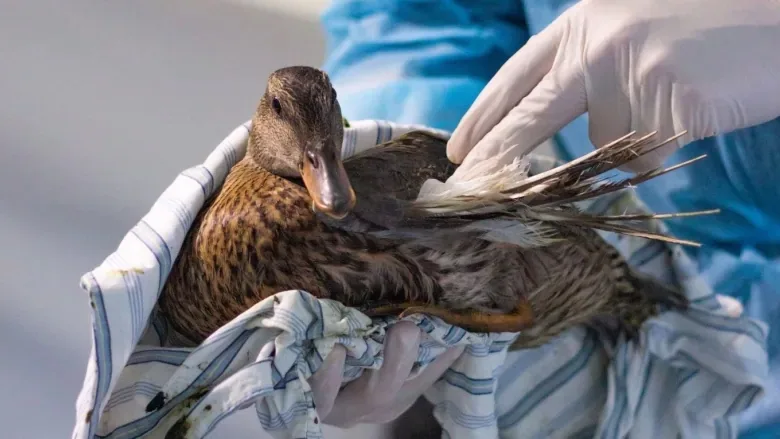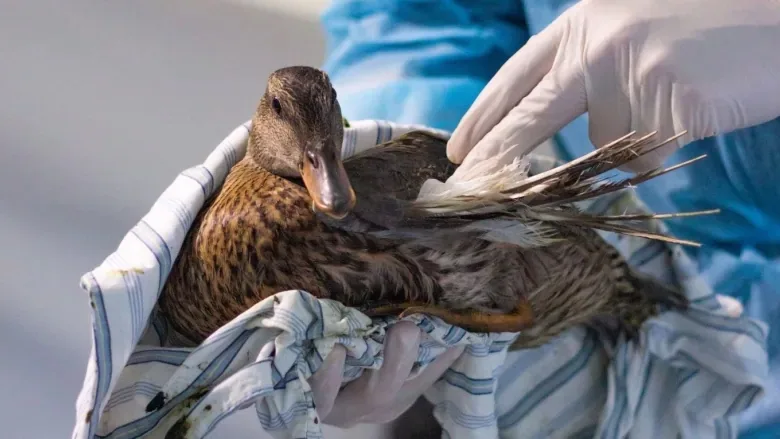
Ever wonder why signs tell you not to feed the birds? Here's the answer
Manitoba bird experts are warning the public to think twice about feeding bread to wild birds after two mallards were seen at Winnipeg's St. Vital Park with signs of a condition known as angel wing — a syndrome that affects aquatic birds like ducks and geese and can permanently deform their wings.
Angel wing is caused by a nutritional deficiency that comes from humans feeding wild birds foods high in carbohydrates and sugar, such as bread.
"As a result, the growing feathers are too heavy and cause the bone to start hanging and twisting outwards," said Angie Furniss, rehabilitation manager at Wildlife Haven Rehabilitation Centre in Île-des-Chênes, Man.
SEE ALSO: Scientists figure out how many birds are in the wild. What's your guess?
The disorder causes rapid growth of all the bird's feathers that are connected to their muscle development, causing the feathers to stick out, said Furniss. The birds are then unable to hold their wings close to their bodies, leaving them on the path to a horrific death as they are incapable of migrating south.
"I would say at any park — we should not be feeding birds at this moment," Furniss told host Keisha Paul during a Sunday interview with CBC's Weekend Morning Show.
Angel wing can only be repaired in birds that are young, and it's rare for adult birds to survive the condition on their own, she said.
"[Bread] fills them up, and then they don't want to go and eat nutritious foods."

Wildlife Haven says they sent staff to retrieve two mallards with angel wing from Winnipeg's St. Vital Park, after receiving around 10 calls a day about them. (Wildlife Haven/Facebook)
RELATED: Why experts advise against feeding wildlife
Wildlife Haven was receiving 10 phone calls a day from people who had seen the two mallards with deformed wings at St. Vital's duck pond, according to Furniss. Staff were sent to retrieve the birds on Thursday, who will likely require euthanasia, she said.
Throwing bread into duck ponds is also not a great idea since the food can turn mouldy and attract rodents, said Furniss. It may also lead to overcrowding among the birds, which is not ideal given recent surges in avian influenza.
"People don't realize by just feeding [the birds] bread, it's causing more than just the angel wing."
Cut up lettuce and cracked corn are safe options if feeding wild birds is a must, said Furniss.
SEE ALSO: Rapid spread of avian flu a 'global concern'
Good intentions, ill effect of feeding birds
People who feed birds believe they're doing the right thing, she said, and it comes from a good place, but Furniss says it is our responsibility to help prevent angel wing.
She'd like to see more education about the disorder for the public.
"We're the ones who are causing it, so we're the ones who should be fixing it."
Heather Hinam, president and CEO of Second Nature Creative Interpretation, says people often feed birds because they want to feel a connection with nature.
WATCH: City lights are confusing birds, here's how to help our feathered friends
People feeding wildlife and posting it to social media is part of the problem too, she says. While the posts may not seem damaging on the surface, Hinam says they perpetuate a dependance on humans for food, which harms wildlife.
"People just want to be that Disney princess … [but] you're ultimately hurting them more than you're helping them," she said.
Hinam was glad to hear that the two mallards at St. Vital Park got picked up, but it's the first time in years that she's heard of angel wing in Manitoba, she said.
'Just enjoy wildlife being wild'
Visiting St. Vital Park in the past, Hinam says she noticed the signs that discourage feeding birds were not as eye-catching as she'd hoped. She also said not everyone is able to read them.
SEE ALSO: Billions of birds vanished since 1970, here's how to curb decline
The signs could have a stronger impact if they told people about the permanent damage that feeding birds bread can cause, according to Hinam.
"Do the signs even say 'Don't feed the birds because it can cause permanent disfiguration'? Maybe that's what we need," she said.
"Just saying 'Don't feed the birds,' doesn't tell them why."
Hinam says she'd also like to see an education campaign to dissuade feeding bread to birds, so people can be aware of the consequences to their actions.
Sometimes nature needs to be enjoyed from an outside perspective, she said, and humans don't need to insert themselves into every situation.
"Just enjoy wildlife being wild."
WATCH: How birds are adapting and lowering risk of extinction
The story, written by Ozten Shebahkeget, was originally published for CBC News.





